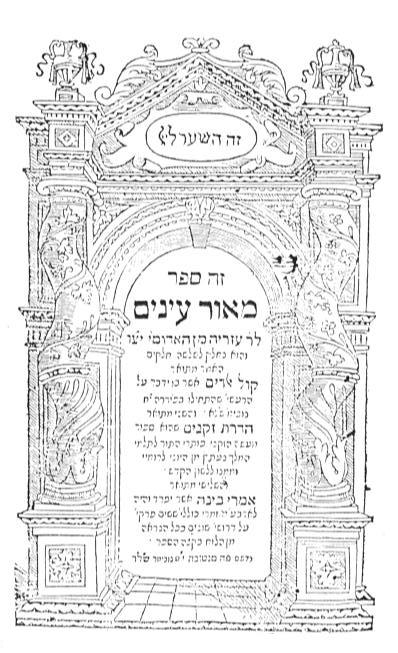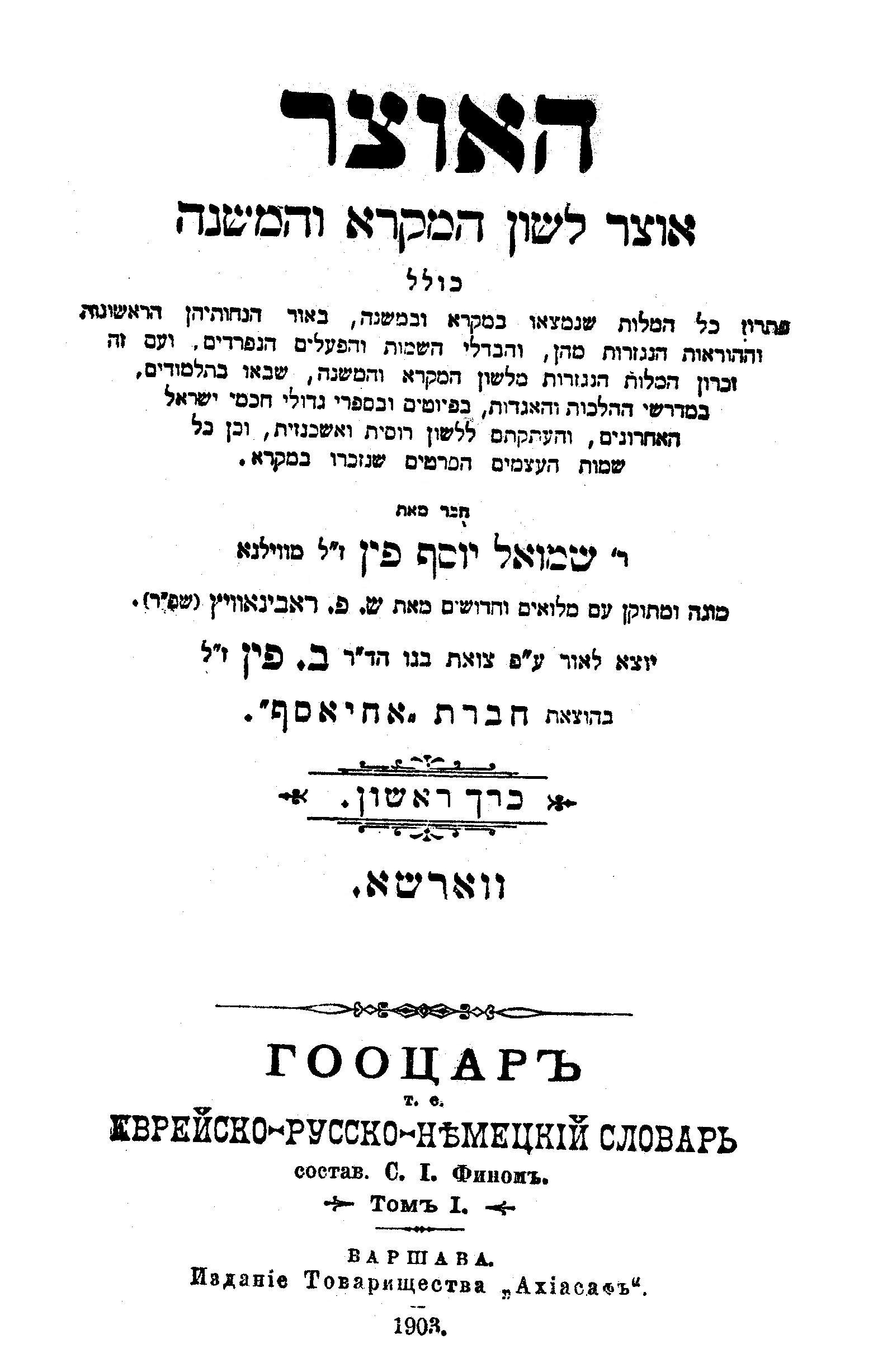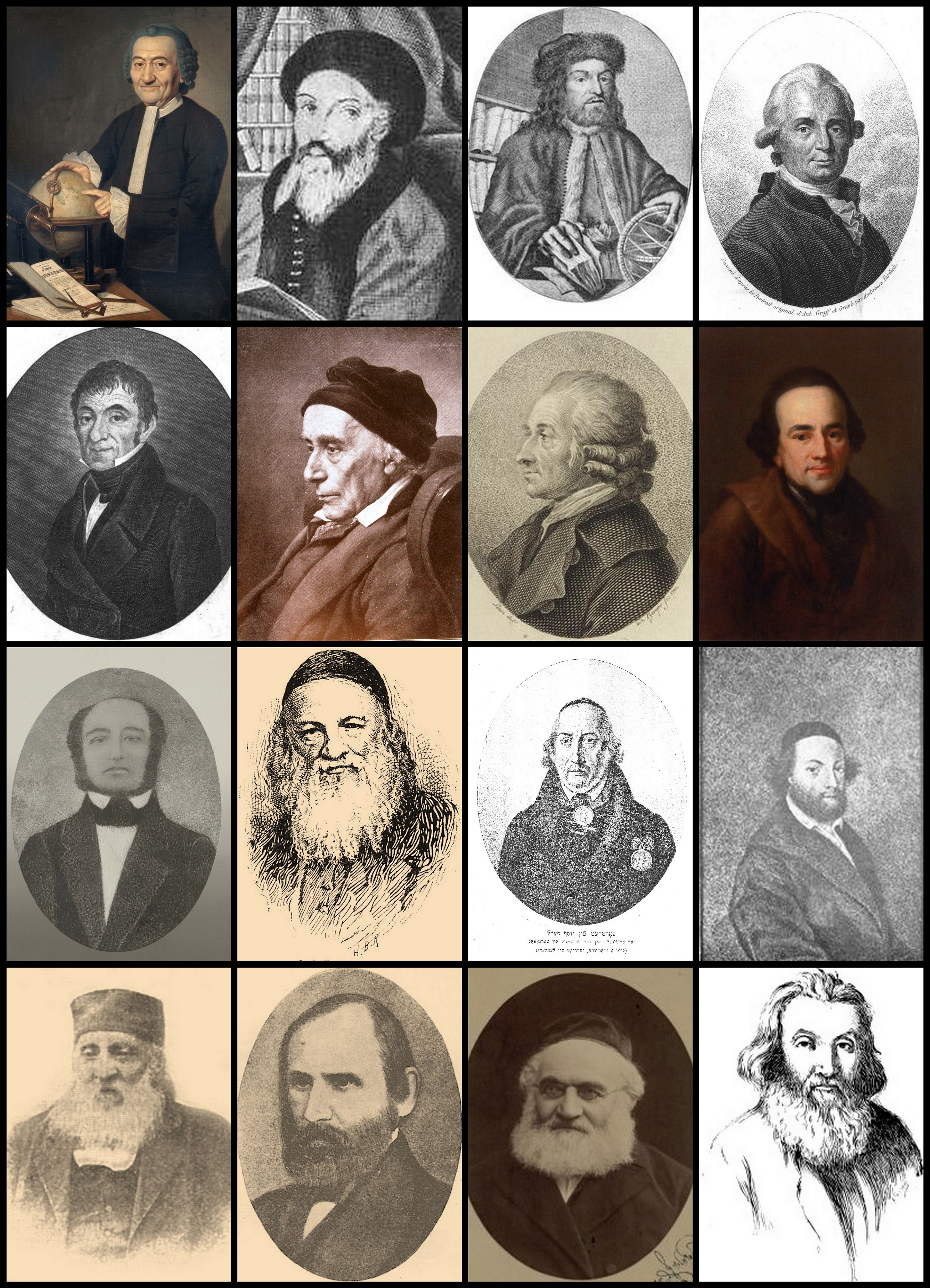|
Isaac Ben Jacob Benjacob
Isaac ben Jacob Benjacob (January 10, 1801, Ramygala – July 2, 1863, Vilnius) was a Lithuanian Jewish Maskil, best known as a bibliographer, author, and publisher. His 17-volume Hebrew Bible included Rashi, Mendelssohn, as well as his own ''Mikraei Kodesh'' which "emended" the biblical text and helped spread the Haskalah movement. Biography and works Before he learned Russian his parents moved to Vilnius, "and there he received instruction in Hebrew grammar and rabbinical lore."Pending further edits, "Biography and works" is a rewrite of AND THE SINGLE SOURCE for the rest of this Wiki article. Benjacob began to write early, and composed short poems and epigrams in pure Biblical Hebrew which are among the best of their kind in Neo-Hebraic literature. For several years he lived in Riga, where he was engaged in business, always studying and writing in his leisure hours. Later he became a publisher and book-seller and went to Leipzig, where he published his first work, ''Miktami ... [...More Info...] [...Related Items...] OR: [Wikipedia] [Google] [Baidu] |
Ramygala
Ramygala (, literally "quiet end") is a city in Lithuania. It is located some south from Panevėžys on the banks of the Upytė River, a tributary to the Nevėžis River. According to 2017 estimate, it had 1,440 residents. History The name "Ramygala" was first mentioned in the 13th century. In 1370 the place suffered from the Teutonic Knight attack. Sometime before 1500 the first church was built and in 1503 the name "Ramygala" was used to refer to a town. Since then Ramygala slowly grew. Few years later it had a manor, and at the end of the 16th century it received a privilege to host fairs. Unlike many other towns in Lithuania, Ramygala did not belong to a noble family but rather to Vilnius Cathedral and later to Vilnius University. In 1781 the town established a parish school next to a new church after the old one was destroyed by fire. The school grew and expanded significantly in the 20th century. It built two new school buildings and a dorm. In 2005 it was named Ramygala ... [...More Info...] [...Related Items...] OR: [Wikipedia] [Google] [Baidu] |
Azariah Dei Rossi
Azariah ben Moses dei Rossi (Hebrew: עזריה מן האדומים) was an Italian-Jewish physician and scholar. He was born at Mantua in 1511; and died in 1578. He was descended from an old Jewish family which, according to a tradition, was brought by Titus from Jerusalem. He was known among Jews as Azariah min-Ha'adumim (Azariah of the Red Family), a play on his name as well as a possible allusion to the fact that he lived in Catholic Italy, Rome being regarded as a spiritual heir of Esau (Edom, from Hebrew ''`-d-m'', red). Combining an insatiable desire for learning with remarkable mental power, Dei Rossi early in life became exceptionally proficient in Hebrew, Latin, and Italian literature. He studied simultaneously medicine, archeology, history, Greek and Roman antiquities, and Christian ecclesiastical history. When about the age of thirty he married and settled for a time at Ferrara. Later he was found at Ancona, Bologna, Sabbionetta, and again at Ferrara. In 1570 a t ... [...More Info...] [...Related Items...] OR: [Wikipedia] [Google] [Baidu] |
Jewish Printing And Publishing
Jews ( he, יְהוּדִים, , ) or Jewish people are an ethnoreligious group and nation originating from the Israelites Israelite origins and kingdom: "The first act in the long drama of Jewish history is the age of the Israelites""The people of the Kingdom of Israel and the ethnic and religious group known as the Jewish people that descended from them have been subjected to a number of forced migrations in their history" and Hebrews of historical Israel and Judah. Jewish ethnicity, nationhood, and religion are strongly interrelated, "Historically, the religious and ethnic dimensions of Jewish identity have been closely interwoven. In fact, so closely bound are they, that the traditional Jewish lexicon hardly distinguishes between the two concepts. Jewish religious practice, by definition, was observed exclusively by the Jewish people, and notions of Jewish peoplehood, nation, and community were suffused with faith in the Jewish God, the practice of Jewish (religious) ... [...More Info...] [...Related Items...] OR: [Wikipedia] [Google] [Baidu] |
Ha-Karmel
''Ha-Karmel'' () was a Hebrew periodical, edited and published by Samuel Joseph Fuenn in Vilna from 1860 to 1880. It was one of the important forces of the Haskalah movement in the Russian Empire. History ''Ha-Karmel'' was founded by Samuel Joseph Fuenn in 1860 as a weekly, and was continued as such (with some interruptions) until 1871. Eight volumes appeared in these eleven years, of which volumes 1–3 have supplements in Russian. It then became a monthly, of which four volumes appeared from 1871 to 1880, when the publication was suspended. was associated with Fuenn in the editorship.''Letters of J. L. Gordon'', no. 87, Warsaw, 1894. later assisted Fuenn in the same capacity. ''Ha-Karmel'' was more of a literary periodical and less of a newspaper than other Hebrew contemporaries like '' Ha-Maggid'' or ''Ha-Melitz'', in part because the license granted by the Tsarist regime prohibited Fuenn from publishing articles on politics. The periodical contained poetry, translations, hist ... [...More Info...] [...Related Items...] OR: [Wikipedia] [Google] [Baidu] |
Samuel Joseph Fuenn
Samuel Joseph Fuenn (; 15 October 1818 – 11 January 1891), also known as Rashi Fuenn () and Rashif (), was a Lithuanian Hebrew writer, scholar, printer, and editor. He was a leading figure of the eastern European Haskalah, and an early member of Ḥovevei Zion. Biography Fuenn was born in Vilna, Russian Empire, the son of merchant and Torah scholar Yitsḥak Aizik Fuenn of Grodno. Though he received a traditional religious education until the age of 17, he also acquired an extensive general knowledge of German literature and other secular subjects, and became proficient in Russian, French, Latin, Polish, and English. He afterwards joined Vilna's circle of young ''maskilim''. In 1848 the government appointed him teacher of Hebrew and Jewish history in the newly founded rabbinical school of Vilna. Fuenn filled this position with great distinction till 1856, when he resigned. The government then appointed him superintendent of the Jewish public schools in the district of Vilna, ... [...More Info...] [...Related Items...] OR: [Wikipedia] [Google] [Baidu] |
Nehemiah Brüll
__NOTOC__ Nehemiah Brüll (16 March 1843 in Rousínov, Moravia – 5 February 1891 in Frankfurt am Main) was a rabbi and versatile scholar. Life Brüll received his rabbinic-Talmudic education from his father, Jakob Brüll (de), who combined wide Talmudic knowledge with acute historical perception. He then studied classical and Oriental languages and history at the University of Vienna, having at the same time a good opportunity to continue his Talmudic studies at the Vienna bet ha-Midrash, then under the direction of men like I. H. Weiss, M. Friedmann, and Adolf Jellinek. Here, too, Brüll, the son of a conservative rabbi, and the grandson of the arch-Orthodox chief rabbi of Moravia, Nahum Trebitsch, developed into a decided Reformer and a disciple of Abraham Geiger. Brüll was called as rabbi to Bzenec, one of the Reform communities of Moravia, an office that be resigned in 1870 in order to take charge of the rabbinate of Frankfurt am Main. He owed this appointment to Ge ... [...More Info...] [...Related Items...] OR: [Wikipedia] [Google] [Baidu] |
Julius Fürst
Julius Fürst (; 12 May 1805, Żerków, South Prussia – 9 February 1873, Leipzig), born Joseph Alsari, was a Jewish German orientalist and the son of noted maggid, teacher, and Hebrew grammarian Jacob Alsari. Fürst was a distinguished scholar of Semitic languages and literature. During his years as professor in the department of oriental languages and literature at the University of Leipzig (1864–1873), he wrote many works on literary history and linguistics. Biography At an early age, Fürst had a remarkable knowledge of Hebrew literature, Old Testament scriptures and oriental languages. In 1825, after having studied at Berlin, where Hegel and Neander were among his teachers, he took a course in Jewish theology at Posen. In 1829, after having abandoned his Jewish orthodoxy, he went to Breslau, and in 1831 to Halle. Here he took his degree in oriental languages and theology under Gesenius in 1832.Jewish Encyclopedia Bibliography: *Delitzsch'Zur Gesch. der Jüdischen P ... [...More Info...] [...Related Items...] OR: [Wikipedia] [Google] [Baidu] |
Talmudic
The Talmud (; he, , Talmūḏ) is the central text of Rabbinic Judaism and the primary source of Jewish religious law (''halakha'') and Jewish theology. Until the advent of modernity, in nearly all Jewish communities, the Talmud was the centerpiece of Jewish cultural life and was foundational to "all Jewish thought and aspirations", serving also as "the guide for the daily life" of Jews. The term ''Talmud'' normally refers to the collection of writings named specifically the Babylonian Talmud (), although there is also an earlier collection known as the Jerusalem Talmud (). It may also traditionally be called (), a Hebrew abbreviation of , or the "six orders" of the Mishnah. The Talmud has two components: the Mishnah (, 200 CE), a written compendium of the Oral Torah; and the Gemara (, 500 CE), an elucidation of the Mishnah and related Tannaitic writings that often ventures onto other subjects and expounds broadly on the Hebrew Bible. The term "Talmud" may refer to eith ... [...More Info...] [...Related Items...] OR: [Wikipedia] [Google] [Baidu] |
Mishnaic
The Mishnah or the Mishna (; he, מִשְׁנָה, "study by repetition", from the verb ''shanah'' , or "to study and review", also "secondary") is the first major written collection of the Jewish oral traditions which is known as the Oral Torah. It is also the first major work of rabbinic literature. The Mishnah was redacted by Judah ha-Nasi probably in Beit Shearim or Sepphoris at the beginning of the 3rd century CE in a time when, according to the Talmud, the persecution of the Jews and the passage of time raised the possibility that the details of the oral traditions of the Pharisees from the Second Temple period (516 BCE – 70 CE) would be forgotten. Most of the Mishnah is written in Mishnaic Hebrew, but some parts are in Aramaic. The Mishnah consists of six orders (', singular ' ), each containing 7–12 tractates (', singular ' ; lit. "web"), 63 in total, and further subdivided into chapters and paragraphs. The word ''Mishnah'' can also indicate a single paragraph of th ... [...More Info...] [...Related Items...] OR: [Wikipedia] [Google] [Baidu] |
Hebrew Language
Hebrew (; ; ) is a Northwest Semitic language of the Afroasiatic language family. Historically, it is one of the spoken languages of the Israelites and their longest-surviving descendants, the Jews and Samaritans. It was largely preserved throughout history as the main liturgical language of Judaism (since the Second Temple period) and Samaritanism. Hebrew is the only Canaanite language still spoken today, and serves as the only truly successful example of a dead language that has been revived. It is also one of only two Northwest Semitic languages still in use, with the other being Aramaic. The earliest examples of written Paleo-Hebrew date back to the 10th century BCE. Nearly all of the Hebrew Bible is written in Biblical Hebrew, with much of its present form in the dialect that scholars believe flourished around the 6th century BCE, during the time of the Babylonian captivity. For this reason, Hebrew has been referred to by Jews as '' Lashon Hakodesh'' (, ) since an ... [...More Info...] [...Related Items...] OR: [Wikipedia] [Google] [Baidu] |
Russian Language
Russian (russian: русский язык, russkij jazyk, link=no, ) is an East Slavic languages, East Slavic language mainly spoken in Russia. It is the First language, native language of the Russians, and belongs to the Indo-European languages, Indo-European language family. It is one of four living East Slavic languages, and is also a part of the larger Balto-Slavic languages. Besides Russia itself, Russian is an official language in Belarus, Kazakhstan, and Kyrgyzstan, and is used widely as a lingua franca throughout Ukraine, the Caucasus, Central Asia, and to some extent in the Baltic states. It was the De facto#National languages, ''de facto'' language of the former Soviet Union,1977 Soviet Constitution, Constitution and Fundamental Law of the Union of Soviet Socialist Republics, 1977: Section II, Chapter 6, Article 36 and continues to be used in public life with varying proficiency in all of the post-Soviet states. Russian has over 258 million total speakers worldwide. ... [...More Info...] [...Related Items...] OR: [Wikipedia] [Google] [Baidu] |
Maskilim
The ''Haskalah'', often termed Jewish Enlightenment ( he, השכלה; literally, "wisdom", "erudition" or "education"), was an intellectual movement among the Jews of Central and Eastern Europe, with a certain influence on those in Western Europe and the Muslim world. It arose as a defined ideological worldview during the 1770s, and its last stage ended around 1881, with the rise of Jewish nationalism. The ''Haskalah'' pursued two complementary aims. It sought to preserve the Jews as a separate, unique collective, and it pursued a set of projects of cultural and moral renewal, including a revival of Hebrew for use in secular life, which resulted in an increase in Hebrew found in print. Concurrently, it strove for an optimal integration in surrounding societies. Practitioners promoted the study of exogenous culture, style, and vernacular, and the adoption of modern values. At the same time, economic production, and the taking up of new occupations was pursued. The ''Haskalah'' pr ... [...More Info...] [...Related Items...] OR: [Wikipedia] [Google] [Baidu] |






